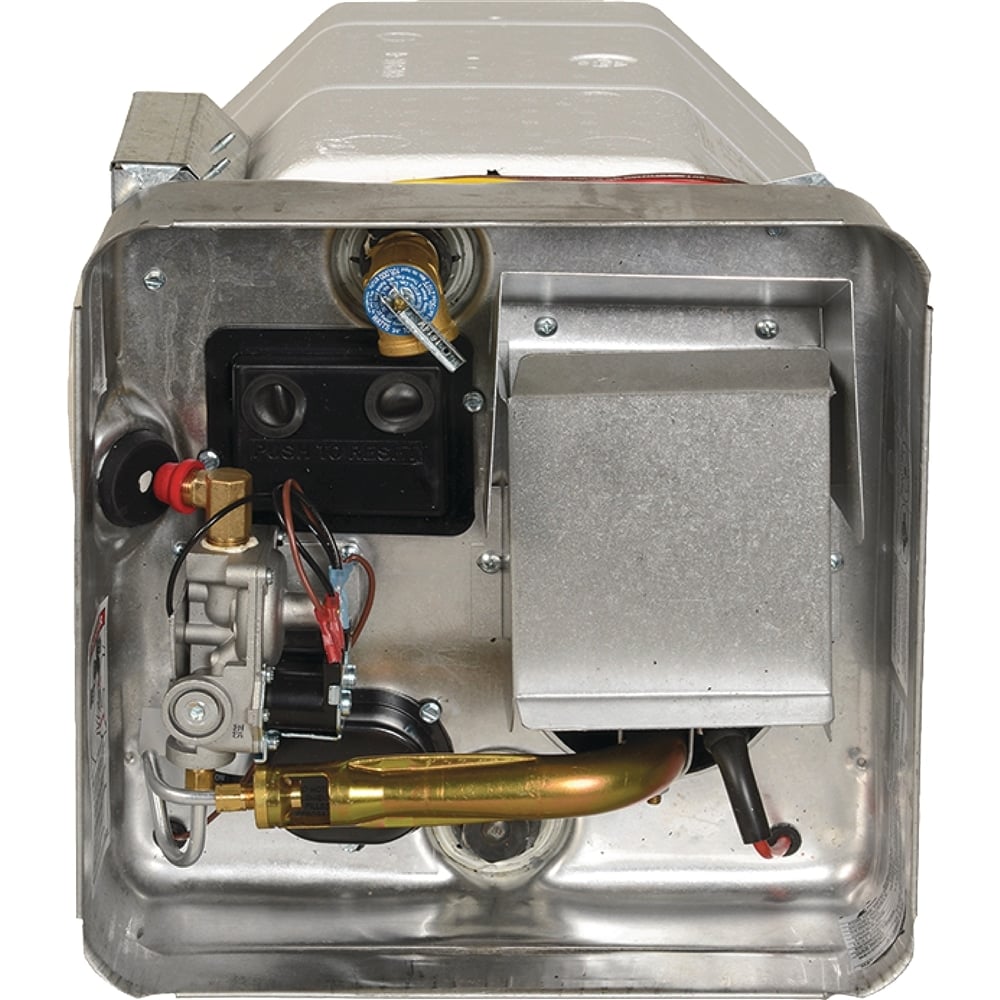RV Water Heater : 3 Things I Wish Everyone Knew About

Just like your residential water heater, your RV water heater needs rust protection. This protection is normally provided by a magnesium anode already installed in the tank. However, this anode needs some maintenance. If you’re an RV owner, you should read the following blog post.
Taking care of your rv water heater is essential to enjoy endless supply of hot water all year long. When the water heaters run normally, the heating element will be able to heat the water so you can enjoy hot showers during your camping trips.
What Is The Magnesium Anode Used For In The RV Water Heater
Almost every hot water tank has some cathodic protection installed to protect the tank against corrosion. For RV water heater, a magnesium anode will be used as sacrificial protection. Since magnesium is a more active metal than the one used for making the water heater, magnesium will sacrifice itself to protect the tank.
However, once the magnesium anode is completely consumed, corrosion will then attack the water heater directly and affect its life. When you use this kind of cathodic protection, you need to do maintenance at least once a year and verify the anode. A good maintenance will assure you to have an optimal water temperature and good water pressure all year long.
More efficient cathodic protection is now available for RV water heaters
In 2020, Corro-Protec adapted its powered anode used in residential water heaters to allow it to be installed in RV tanks. Unlike magnesium anodes, powered anodes do not require any maintenance and are designed to provide corrosion protection for over 20 years.
This protection is provided by a current rectifier which sends energy through a titanium anode rod. This anode then supplies the electrons necessary for the tank to completely stop the corrosion. Plus, Corro-Protec RV powered anodes limit the growth of bacteria that cause rotten egg odors in hot water and don’t need any maintenance.
Your RV Water Heater Anode Rod Should Be Checked Every Year

Each year when servicing your RV, you should take a few extra minutes to check the condition of the magnesium anode. This anode is located at the bottom of the water heater tank and is also often used as a drain to empty the RV water heater. When you have the right tools, the anode unscrews easily and just pull on it to remove it from the tank.
The magnesium anode should be replaced when it has lost approximately 50% of its original mass. If you neglect this check and the magnesium anode is no longer effective, the life expectancy of your tank will be affected.
RV water heater manufacturers also mention that it is very important to empty the tank when you are not using your RV, as water with high levels of Iron and / or sulfate is very corrosive and will greatly reduce the life of the anode.
If you are looking for a long term solution that requires less maintenance, Corro-Protec RV powered anode rod is what you need. These anodes are made of titanium and send a continuous current through the water to stop corrosion. Installation only takes a few minutes and the anode feeds directly into your RV’s existing wiring.
The Anode Can Be The Cause Of The Sulfur Smell In Hot Water
The smell of sulfur is present in many homes in North America and can be a recurring problem for campers as well. This foul odor is often very pronounced and difficult to ignore. There are two main causes that can explain the presence of odor in your rv water heater:
Sulfate reducing bacteria in your RV water heater
This bacteria is the # 1 cause of sulfur odors in RV water heaters. This bacteria is found in water and grows normally when water is heated in a metal tank. There are two ways to kill this bacteria and stop odor problems.
• Install an impressed current anode
If you have a Suburban water heaters, the first method is to install an impressed current anode. The current sent through the anode in the water immediately kills the bacteria, which stops the smell of sulfur in hot water. Impressed current anodes are easy to install, have a high efficiency and are typically designed to last for several years.
• Bleach treatment
The second solution is to perform a bleach treatment in the RV water heater. However, this will only eliminate odors for a few days and this cleaning is generally longer and complex.
Reaction with the magnesium anode
In some cases, the smell of sulfur is caused by water with a high magnesium content coming in contact with the original anode already present in your water heater. If the odor problem stems from the reaction between the magnesium anode and your water, there are several options available to you. However, it’s important to know that not all of these options are good in the long run.
• Remove the magnesium anode
This problem could be solved by removing the magnesium anode from the tank. However, this is very dangerous for the water heater, because then it will be deprived of its only protection against rust. This would require you to change your tank after just a few years.
• Install an imposed current anode
Once again, the installation of a Corro-Protec RV water heater powered anode is the ideal solution to these problems because, in addition to stopping that rotten egg smell, these anodes are made of insoluble titanium, which limits their debris. In addition, this technology does not require maintenance and is good for many years. Corro-Protec anodes are easy to install and will solve your odor problems in just a few hours.
Whether you have an rv tankless water heater. an electric water heater or a gas water heater, you must make sure you are doing the proper maintenance.





What do you know about your RV water heater?
Almost every hot water tank has some cathodic protection installed to protect the tank against corrosion. For RV water heater, a magnesium anode will be used as sacrificial protection. Since magnesium is a more active metal than the one used for making the water heater, magnesium will sacrifice itself to protect the tank.
Corro-Protec adapted its powered anode used in residential water heaters to allow it to be installed in RV tanks.
The anode then supplies the electrons necessary for the tank to completely stop the corrosion. Plus, Corro-Protec RV powered anodes limit the growth of bacteria that cause rotten egg odors in hot water and don’t need any maintenance.
Make your RV the place to be – BUY NOW!
Blog
Stop Your RV Water From Smelling Like Rotten Eggs
The smell of rotten eggs in your RV water can be alarming and unpleasant. This common issue, often caused by hydrogen sulfide gas, must be […]
Your Ultimate RV Maintenance Checklist
Properly maintaining your RV will help it look and run efficiently now and in the future. Ongoing maintenance can also help you avoid more expensive […]

